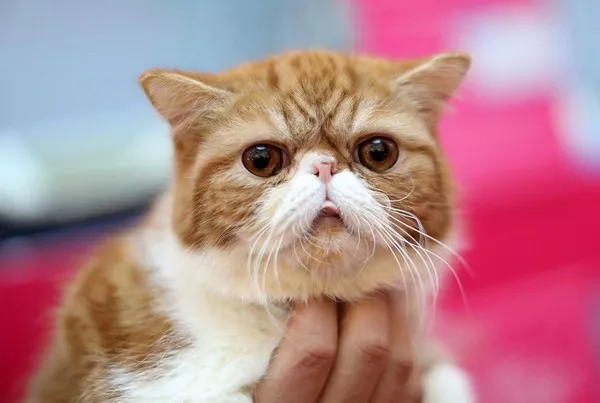The Cornish Rex, with its distinctive curly coat and playful personality, is a captivating breed that brings joy and laughter to its owners. However, their boundless energy and mischievous antics can sometimes leave even the most patient cat lover wondering, “When will my Cornish Rex calm down?”
While these felines are known for their kitten-like exuberance throughout their lives, understanding their unique needs and implementing appropriate strategies can help channel their energy in positive ways and encourage calmer behavior.
Unveiling the Energetic Nature of the Cornish Rex
The Cornish Rex’s high energy levels are deeply rooted in their genetics and history. Developed from a natural mutation in Cornwall, England, in the 1950s, the breed quickly gained popularity for its playful and athletic nature. Bred for their agility and intelligence, these cats possess a natural curiosity and an insatiable desire to explore their surroundings.
Several factors contribute to their energetic disposition:
Unique Coat: Unlike other cat breeds, the Cornish Rex lacks the typical guard hairs, resulting in a soft, wavy coat that feels like a rabbit‘s fur. This unusual coat contributes to their high internal temperature, keeping them warm and active.
Slender Build: Their slender and athletic build allows for bursts of speed and impressive agility. They love to jump, climb, and perform acrobatic feats, showcasing their boundless energy.
High Metabolism: Cornish Rexes have a naturally high metabolism, requiring more frequent meals and playtime compared to other breeds. This constant need for fuel keeps them on the move and contributes to their active nature.
Intelligence and Curiosity: These cats are highly intelligent and curious, constantly seeking mental stimulation and new challenges. This can manifest as playful antics, exploration, and a desire to interact with their owners.
Understanding the Timeline of a Cornish Rex’s Development
While Cornish Rexes are known for their lifelong playful demeanor, their energy levels do tend to fluctuate throughout their life stages:
Kittenhood (0-6 months): This is the peak of their energetic phase. Expect boundless curiosity, playful antics, and a constant need for attention and interaction.
Adolescence (6-18 months): While still highly energetic, they may start to show signs of settling down as they mature. Their play may become more focused and interactive, and they may develop a deeper bond with their owners.
Adulthood (18 months – 8 years): Although they retain their playful spirit, adult Cornish Rexes may exhibit calmer behavior compared to their kitten and adolescent selves. They may still have bursts of energy, but they also learn to appreciate moments of relaxation and cuddles.
Senior Years (8 years and above): As they age, their energy levels naturally decline. However, even senior Cornish Rexes can surprise you with their playful spirit and zest for life.
It’s important to remember that each cat is an individual, and the timeline for calming down can vary depending on their personality, environment, and overall health.
Strategies for Channeling Your Cornish Rex’s Energy
While you may not be able to completely eliminate your Cornish Rex’s energetic nature, there are several strategies you can implement to help them channel their energy in positive ways and encourage calmer behavior:
Provide Ample Playtime: Engage your Cornish Rex in interactive play sessions several times a day. This can include feather wands, laser pointers, puzzle toys, and even games of fetch. Providing an outlet for their energy can help prevent destructive behavior and promote mental stimulation.
Create a Stimulating Environment: Enrich your cat’s environment with climbing structures, scratching posts, and perches. This allows them to explore their natural instincts to climb and jump, expending energy in a positive way.
Establish a Routine: Cornish Rexes thrive on routine. Set regular feeding times, playtime sessions, and even cuddle times. This predictability can help reduce anxiety and encourage calmer behavior.
Training and Positive Reinforcement: Train your Cornish Rex using positive reinforcement techniques. This can include teaching them tricks, playing interactive games, and rewarding desired behaviors. Training not only provides mental stimulation but also strengthens your bond with your cat.
See Also:A Comprehensive Guide to Describe Cornish Rex Cats’ Appearance
Consider a Companion: If you are away from home for extended periods, consider getting another cat or a playful dog as a companion for your Cornish Rex. This can provide them with social interaction and an outlet for their energy.
Ensure Proper Nutrition: Feed your Cornish Rex a high-quality diet that meets their energy needs. Consult with your veterinarian to determine the appropriate food and feeding schedule for your cat.
Regular Veterinary Checkups: Underlying medical conditions can sometimes contribute to hyperactive behavior. Regular veterinary checkups can ensure your cat is healthy and address any potential medical issues.
Embracing the Uniqueness of the Cornish Rex
While their energetic nature can be challenging at times, it’s important to remember that this is an inherent part of the Cornish Rex’s charm. By understanding their needs and implementing appropriate strategies, you can help your feline companion lead a happy, healthy, and fulfilling life.
Embrace their playful spirit, engage them in enriching activities, and cherish the moments of cuddles and affection. With patience, understanding, and a little creativity, you can build a strong bond with your Cornish Rex and appreciate their unique personality for what it is – a source of joy, laughter, and endless entertainment.
Related Topics:
Can Cornish Rex Cats Go Outside? (The Important Reasons)
How Long Do Cornish Rex Cats Live: Here’s What to Know
A Pricing Guide to Cornish Rex Kittens

























